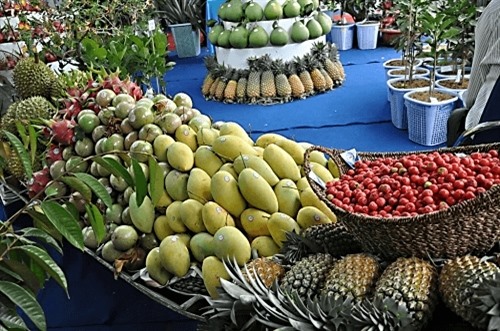Investment in fruit, vegetable processing surges as companies realise potential
Fruit and vegetable exports, which have been growing at around 15 per cent annually for the past five years, are a highly attractive business activity for enterprises.

Fruit and vegetable exports, which have been growing at around 15 per cent annually for the past five years, are a highly attractive business activity for enterprises, which are increasingly investing in large and modern processing plants.
Long An Province-based Lavifood Joint Stock Company earlier this month put into operation a VND1.78 trillion (US$76.7 million) fruit and vegetable processing plant with a capacity of 60,000 tonnes of finished products a year in Tay Ninh Province.
Pham Ngo Quoc Thang, the company’s chairman, said: “To come up with processed products of international standards, the factory has boldly invested in most modern technologies and machinery from countries such as the US, Germany, Italy, and Japan.”
It is the first factory in Viet Nam with a Leed Silver certificate, and the first fruit and vegetable processing factory in Viet Nam to use high pressure processing (HPP) technology that keeps them longer and helps preserve natural flavours and nutrition.
Thang said the plant would produce frozen fruits, juices, dried fruits, soft-dried fruits, and fruit juice concentrates for export to the US, EU, South Korea, Japan, and Australia.
To ensure supply of raw materials, Lavifood had tied up with farmers and co-operatives in Tay Ninh Province who would grow fruits and vegetables based on its needs, given them training in farming techniques and agreed to buy their output at reasonable prices.
The company plans to build 10 modern fruit and vegetable processing plants and tie up with farmers owning 33,000ha of land in the next 10 years.
Vina T&T Import Export Trading Service Co., Ltd last November began construction of its Kim Thanh-Ben Tre fresh coconut processing plant in Ben Tre Province with a total capacity of 25 million fresh coconuts a year.
The VND200 billion ($8.6 million) plant is expected to come on stream this year, and it would help preserve fresh coconuts for long and make the company’s products competitive in the US market, Nguyen Dinh Tung, its general director, said.
More importantly, it would help keep prices steady through the year for farmers, unlike now when prices rise in the dry season and fall during the rainy season, he said.
Last October Nafoods Group JSC and the People’s Committee of Tay Ninh Province signed a memorandum of understanding to grow organic fruit trees on some 10,000ha at a cost of VND3 trillion ($128.6 million) between 2019 and 2023.
Once it is able to supply at least 150 tonnes of fruit a a day, Nafoods will build a plant in the province to process them for exports worth at least $100 million a year.
According to the Ministry of Agriculture and Rural Development, some 16 agricultural produce processing plants costing VND8.7 trillion ($374.7 million) were under construction or began operating last year.
Export potential
Le Thanh, director of the Institute of Viet Nam Organic Agricultural Economics, said the fruit and vegetable sector was very appealing to investors because there was good growth in the global market.
“Global fruit and vegetable consumption is increasing by over 15 per cent a year. With increasing concern about health benefits, people are reducing consumption of meats and eating more fruits and vegetables.”
Viet Nam’s varied geographic and climatic conditions enable it to grow a diverse range of fruits and vegetables, giving it great export potential, he added.
Minister of Agriculture and Rural Development Nguyen Xuan Cuong said, “Viet Nam’s fruit and vegetable exports … [at] $3.8 billion last year, exceeded rice exports.”
But there is still much room for increasing exports, and investing in large-scale processing plants is among the factors that could help the sector reach the export target of $10 billion set for 2025, according to the minister.
The country has 1.6 million hectares under fruits and vegetables, which yield around 25 million tonnes a year. With 150 processing plants, the country can only process one million tonnes a year.
“The setting up of processing plants in the past proved that Vietnamese enterprises have the capability to invest in and manage plants with most advanced technologies and large capacities to produce fruit and vegetable products that are in high demand in the world market,” he said.
Cuong suggested enterprises should invest more in modern processing plants to further penetrate the world market of 7.5 billion people.
Investing in processing would increase the added value of vegetables and fruits and boost exports and strengthen Vietnamese agricultural brands in the global market, he added. — VNS





